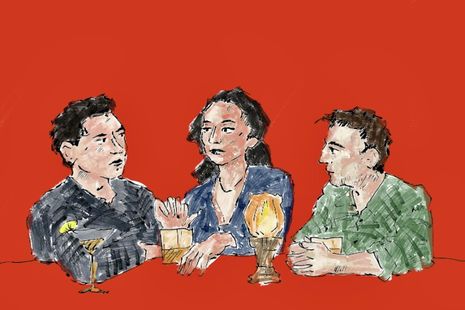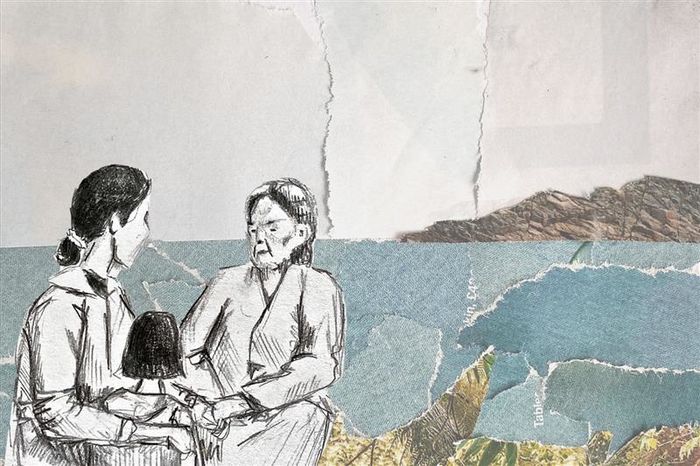The convergence of past, present and future in Past Lives
Julia Ongking explores how Past Lives’ portrayal of fate challenges traditional Hollywood narratives

In my last article for Varsity, I wrote about the inevitable entanglement between ambition and sacrifice in When Life Gives You Tangerines. What I wasn’t able to fully examine, however, is how behind sacrifice and ambition lies fate: our birth into pre-determined communities, histories and obligations that both precede us and determine our futures.
Celine Song’s Past Lives examines fate at a personal level, exploring how it shapes the trajectories of individual lives. The film follows protagonist Nora Moon, played by Greta Lee, and her experience immigrating from Korea to Canada, and later to New York – each stage of her life marking a ‘past self’ that continues to shape her relationships. At the heart of the film lies a tension-filled trio between Nora, her childhood lover from South Korea, Hae-Sung (Teo Yoo) and her American husband Arthur (John Magaro). As Hae-Sung visits Nora in New York, her home city after her emigration from South Korea twenty years prior, we see her grapple with her unresolved feelings with her past identity, culture, and ultimately, life.
To me, Past Lives provides a counter perspective to the Western singularity of fate, depicting it as inalienably plural, layered, and everyday. Western narratives typically exhibit fate as directive and linear, where individuals take charge of their fate, working towards a fairytale resolution. Song does a great job subverting this trope for viewers, who are likely rooting for a whirlwind reconciliation between Nora and Hae-Sung. She foreshadows this traditionally Hollywood logic of fate with Arthur, a writer himself in the film, telling Nora that “in the story, I would be the evil white American husband standing in the way of destiny”.
“Past Lives provides a counter perspective to the Western singularity of fate”
Yet the magic of Past Lives, and arguably, Celine Song’s other productions, lies in a character-driven plot, where Arthur’s emotional maturity and vulnerability with Nora make it impossible to characterise him as a villain. Likewise, Hae-sung cannot be construed as a homewrecker or as having generally malicious intent, as he visits Nora as a friend, seeking closure to a decades-long, unfulfilled emotional connection. The interplay of the characters, within what appears to be a situation filled with conflicting interests, exemplifies Eastern notions of fate as being multidimensional, where fate is not a single, fixed journey but composed of multiple, distinct threads that result in their own unique outcomes.
Nora’s fate in Past Lives is multi-fold: she is a girl from Korea who grew up with unresolved feelings for her childhood playmate, Hae-sung. Yet she is also a girl of ambition who thrived creatively in the West as a result of her family’s emigration and an American immigrant who needed to prematurely marry her husband to secure her Green Card. While all of these trajectories colour Nora’s present circumstances – married to a foreigner, unable to rekindle a relationship with Hae-sung – Song never implies one outcome as morally superior to another, but a natural consequence of intersecting stories, creating lives shaped by different relationships, obligations, and choices made along the way.
Throughout the film, Song explicitly references the Korean and Buddhist conception of in-yun. In-yun describes the fate that connects people through encounters, whether fleeting or profound. In following the lives of each of her three protagonists, Song explores how Nora’s relationships with Hae-sung and Arthur are not oppositional but cumulative – each belonging to her, without invalidating the other. Furthermore, Hae-sung tells Arthur that “we are in-yun too,” depicting fate not as a grand or dramatic force, but an everyday underpinning beneath connections that grow and change through space and time. From this lens, Song’s trio is reframed not as a love triangle with a clear winner or loser, but as three lives brought together, each carrying its own history.
“Song portrays fate as a neutral force that only asks for acceptance and discovery”
On their final night in New York, Nora tells Hae-sung, “the Na-young [Nora] you remember doesn’t exist here. But… that little girl did exist. […] 20 years ago, I left her behind with you”. While Western approaches to fate often thrive on narratives of regret and fears of what if I missed my one shot?, Song portrays fate as a neutral force that only asks for acceptance and discovery. The final scene in Past Lives simultaneously holds Nora’s multitudes of truth – she breaks down in tears after saying goodbye to Hae-sung, but she does so in Arthur’s arms. The film doesn’t ask whether she chose the right fate or if she’d made a mistake letting go of her childhood lover, but simply shows how both lives were real and matter in the making of her present identity and circumstances.
Ultimately, Past Lives challenges the idea that fate creates a singular, triumphant outcome. Rather, it shows how people belong to multiple histories at once, even when they don’t align neatly with their present life. Nora’s marriage to Arthur does not negate the connection she once shared with Hae-sung and her Korean upbringing, just as Hae-sung’s memories of her childhood self cannot magically help him fit into the life she has built for herself in New York. Additionally, Arthur, despite loving and being loved by Nora, will never fully understand his wife’s Korean heritage and language as well as Hae-sung does. There is no perfect or correct fate for Nora to pursue here: rather, both men hold distinct parts of her that embody in-yun, or the cumulative notion of fate.
In Song’s world, fate is defined not by choosing one life over another. Rather, fate is something that grows alongside ourselves, as we learn to carry the many selves, histories, and connections – even those we cannot return to – that make us uniquely whole.
 News / Cambridge academics sign open letter criticising research funding changes22 February 2026
News / Cambridge academics sign open letter criticising research funding changes22 February 2026 News / University Council rescinds University Centre membership20 February 2026
News / University Council rescinds University Centre membership20 February 2026 News / Supporters protest potential vet school closure22 February 2026
News / Supporters protest potential vet school closure22 February 2026 News / Hundreds of Cambridge academics demand vote on fate of vet course20 February 2026
News / Hundreds of Cambridge academics demand vote on fate of vet course20 February 2026 Comment / A tongue-in-cheek petition for gowned exams at Cambridge 21 February 2026
Comment / A tongue-in-cheek petition for gowned exams at Cambridge 21 February 2026








